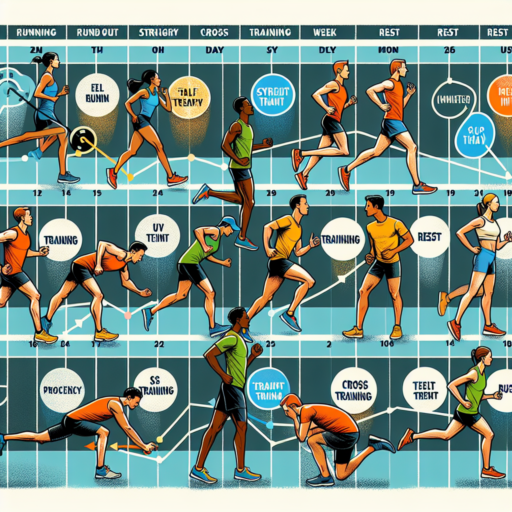Introduction to the Sub 4 Hour Marathon Goal
Achieving a sub 4 hour marathon is a prestigious milestone that many amateur runners aim for. It’s a goal that symbolizes not just endurance, but also a commitment to training and a love for running. A marathon, covering a distance of 26.2 miles or 42.195 kilometers, is a significant challenge in itself. However, finishing it in less than four hours elevates the accomplishment to a noteworthy status. This introduction aims to shed light on the essence of this goal and what it represents to the running community.
Embarking on the journey to complete a marathon in under four hours requires a comprehensive plan that includes structured training, nutrition, and recovery. Understandably, the allure of crossing the finish line with a time starting with a ‘3’ is tempting for many. It signifies breaking through the barrier of recreational running into a more competitive realm. For many, the sub 4 hour marathon is more than just a time goal; it’s a personal challenge that tests both physical and mental resilience.
The sub 4 hour goal serves as a clear target for runners, providing a tangible objective that guides their training schedules and preparation. This time bracket requires maintaining an average pace of approximately 9:09 minutes per mile or 5:41 minutes per kilometer throughout the marathon. Achieving this consistency over such a distance necessitates dedicated training, including long runs, tempo runs, and interval training. Moreover, it highlights the importance of pacing and strategy, underlining the criticality of understanding one’s body and its limits.
Key Components of a Successful Marathon Sub 4 Training Plan
A successful Sub 4 hour marathon plan is a blend of various critical elements that, when combined, prepare a runner not just to finish a marathon, but to do it within the ambitious timeframe of less than four hours. Below are some of the pivotol components that every runner should integrate into their training regimen for optimal performance.
Structured Training Schedule
At the core of a Sub 4 marathon plan is a well-structured training schedule that balances running, recovery, and cross-training. It’s not just about clocking in miles but doing so in a way that enhances both endurance and speed without leading to burnout or injury. Effective schedules progressively increase mileage and intensity, allowing the runner’s body to adapt and grow stronger.
Variety in Training
Variety in training plays a critical role in preparing for a sub 4-hour marathon. This includes a mix of long runs, speed work (like intervals and tempo runs), and recovery runs. Long runs help in building endurance, speed work improves race pace, and recovery runs allow the body to heal and adapt. Balancing these types of workouts is key to improving overall running performance and achieving the sub 4-hour goal.
Weekly Training Schedule Breakdown for Achieving a Sub 4 Marathon
Embarking on the journey to achieve a sub 4-hour marathon requires a meticulously structured training schedule. Aspiring runners must strike a balance between intensity, volume, and recovery, ensuring they progressively increase their fitness while minimizing the risk of injury. This article dives into a week-by-week breakdown designed to propel runners towards their goal while maintaining a holistic approach to training.
Foundation Building and Mileage Increase
The initial weeks are crucial for laying a solid foundation and gradually increasing mileage. A typical week might include three days of moderate-paced runs, focusing on building aerobic capacity, one day dedicated to speed work or interval training to improve lactate threshold, and a long slow distance (LSD) run that increases in length each week. Importance should also be placed on incorporating at least two rest days to facilitate recovery and adapt to the increasing demands.
Peak Training and Simulation Runs
As the weeks progress, introducing more intense sessions and simulation runs becomes pivotal. These simulation runs, closely mimicking the marathon pace, are essential for both physical and mental preparation. Peak training weeks might involve more specialized workouts such as Yasso 800s, tempo runs, and at least one longer run that approaches 20 miles. This phase aims to condition the body for the endurance and pace required to break the four-hour barrier.
Every runner’s journey to a sub 4 marathon will vary, but a well-crafted weekly training schedule is indispensable. Balancing mileage, targeted workouts, and adequate recovery will unlock the door to achieving this coveted goal. Remember, consistency in training, along with proper nutrition and hydration, plays a significant role in crossing the finish line under the desired time.
Nutrition and Hydration Strategies for Sub 4 Marathon Training
Effective nutrition and hydration strategies are pivotal for athletes aiming to achieve a sub 4-hour marathon. The importance of tailoring your diet and fluid intake to meet the rigorous demands of marathon training cannot be overstated. A strategic approach ensures that your body has the necessary fuel and hydration to optimize performance and recovery throughout the training period.
Initially, focusing on a balanced diet rich in carbohydrates, proteins, and healthy fats is essential for sustaining energy levels during long training runs. Carbohydrates are particularly crucial as they serve as the primary energy source for high-intensity endurance activities. Incorporating a variety of whole grains, fruits, and vegetables into your meals can help maintain glycogen stores, while proteins support muscle repair and recovery. For marathon runners, timing nutrient intake around training sessions can significantly enhance both performance and endurance.
Moreover, hydration plays a critical role in successful marathon training. Dehydration can severely impair performance and increase the risk of heat-related illnesses. Therefore, developing a personalized hydration plan that includes pre, during, and post-run fluid intake is necessary. Athletes should aim to start their runs well-hydrated and practice drinking fluids at regular intervals to replace sweat losses. Incorporating electrolyte-rich sports drinks can also aid in maintaining electrolyte balance, especially during longer training runs or in hot weather conditions.
Injury Prevention and Recovery Tips for Marathon Runners
Marathon running is a test of endurance, pushing the limits of human performance. However, this intense physical challenge can also strain the body, making injury prevention and recovery paramount for every runner’s health and success. Understanding and implementing effective strategies are vital components of a robust running regimen.
Essential Injury Prevention Strategies
Preventing injuries before they happen is the cornerstone of any successful marathon training program. Incorporating regular strength training exercises, particularly those that target the core and leg muscles, can improve your stability and reduce the risk of injuries. Additionally, emphasizing proper form and technique during your runs can minimize undue stress on your joints and muscles. A balanced approach to increasing your mileage, avoiding abrupt jumps in distance, is crucial to giving your body the time it needs to adapt and strengthen.
Key Recovery Techniques
After pushing your body to its limits, sufficient recovery is non-negotiable. Integrating active recovery days into your training schedule, such as light jogging or swimming, helps facilitate muscle repair and maintains cardiovascular fitness without overexertion. Employing stretching and foam rolling as part of your post-run routine can aid in alleviating muscle tightness and enhancing flexibility. Furthermore, don’t underestimate the power of rest— ensuring you get plenty of sleep and allowing for complete rest days aids significantly in the recovery process.
Essential Gear and Technology for Sub 4 Marathon Training
Training for a sub 4-hour marathon not only requires dedication and rigorous training but also the right gear and technology to ensure you’re on track to meet your goal. The advancements in running technology and equipment have made it easier for runners to train more effectively, monitor their progress, and make necessary adjustments to their training regimen. In this section, we’ll delve into the essential gear and technological tools that can help elevate your marathon training.
Advanced Running Shoes
The foundation of any successful marathon training program is a pair of high-quality running shoes. Modern running shoes are designed with advanced cushioning technologies, such as Adidas Boost or Nike React foam, that offer unprecedented support and energy return with every step. Finding the right shoe that fits your gait and running style is crucial to prevent injuries and improve running efficiency. It’s worth investing in a gait analysis at a specialty running store to ensure you select the best pair for your feet.
GPS Running Watches
In today’s training landscape, a GPS Running Watch is indispensable for any serious marathon runner. These devices not only track your distance and pace but also monitor advanced metrics like heart rate, cadence, and elevation gain. Brands like Garmin, Suunto, and Polar offer watches specifically tailored for runners, with features like training load analysis and personalized training plans. By leveraging this data, runners can fine-tune their training intensity, duration, and frequency to maximize their marathon performance potential.
Heart Rate Monitors
Understanding and tracking your heart rate is vital in marathon training, especially if you’re aiming for a sub 4-hour finish. Heart Rate Monitors, whether standalone devices or integrated into your GPS watch, allow you to train within specific heart rate zones. This ensures that your training intensity is aligned with your marathon goals, enhancing your endurance and preventing overtraining. Incorporating heart rate zone training into your regimen can significantly improve your aerobic capacity and running economy, essential components for a successful marathon performance.
Mental Preparation and Motivational Techniques for Marathon Runners
Mental preparation and motivational techniques are essential tools for marathon runners, aiming to enhance their mental endurance, focus, and overall performance. Crafting a robust mental strategy is as crucial as physical training when preparing for a marathon. By harnessing the power of psychological resilience, runners can navigate the highs and lows of marathon running more effectively.
Setting Realistic Goals
Establishing achievable, yet challenging goals is a fundamental aspect of mental preparation for marathon runners. By setting clear objectives, runners can maintain focus and motivation throughout their training and the race itself. Goals should not only be about finishing times but also about personal achievements, such as consistent training, overcoming specific hurdles, or simply completing the marathon.
Visualization Techniques
Visualization is a powerful motivational technique that involves picturing oneself successfully completing the marathon, overcoming challenging segments of the course, and experiencing the exhilaration of crossing the finish line. This practice not only boosts confidence but also helps runners mentally rehearse different stages of the race, preparing them for both the physical and emotional challenges ahead.
Embrace Positive Self-Talk: Positive affirmations and self-talk play a pivotal role in building a runner’s mental resilience. Replacing negative thoughts with empowering ones can help maintain high spirits, even when the race becomes particularly challenging. Phrases like «I am strong», «I can do this», and «I’ve prepared for this moment» can significantly influence a runner’s mindset and performance.
Tapering Strategies for the Final Weeks Before Your Marathon
As the final weeks before your marathon approach, the importance of an effective tapering strategy becomes paramount. Tapering, which involves the gradual reduction of training volume and intensity, is crucial for optimizing performance on race day. This phase allows your body to recover from the months of rigorous training and arrive at the starting line in peak condition. Let’s delve into some of the key tapering strategies that can help you make these final weeks count.
Adjust Your Running Volume Gradually
One of the core components of a successful taper is the gradual reduction of your running volume. A sudden decrease in activity can leave your body feeling sluggish, so it’s essential to plan this phase carefully. Consider reducing your mileage by 10-20% each week during the final three weeks before your marathon. This method helps maintain your fitness level without overtaxing your body, ensuring you remain sharp and ready for race day.
Focus on Maintaining Intensity
While it’s important to cut back on the volume of your training, maintaining the intensity of your workouts plays a crucial role in tapering efficiently. Keep including short bursts of race pace or slightly faster runs in your routine. These sessions should be significantly shorter than your usual workouts but performed at a high intensity. This strategy helps in maintaining your neuromuscular coordination and speed, preparing your body for the demands of the marathon without leading to fatigue.
Emphasize Rest and Recovery
Finally, never underestimate the power of rest and recovery during the tapering period. Sleep plays an invaluable role in the body’s healing process, boosting your immune system and repairing muscle tissue. Aim for at least 8 hours of sleep per night and consider incorporating gentle activities like yoga or stretching to promote flexibility and reduce stress levels. Listening to your body and making adjustments based on how you feel is crucial; if you’re feeling particularly worn out, it may be beneficial to take an extra day off from training.
No se han encontrado productos.
Day-of Marathon Strategies to Break the 4-Hour Barrier
Breaking the 4-hour barrier in a marathon is a significant milestone for many runners, marking a transition from casual to serious running. Achieving this requires not just months of training but also smart strategies on the day of the race. It’s all about optimizing performance, conserving energy, and pushing through the mental and physical barriers that arise during those 26.2 miles.
Strategically Plan Your Pace
One key to breaking the 4-hour mark is starting with a pacing strategy that balances ambition with realism. Aiming for an average pace of slightly under 9 minutes per mile allows some leeway for fluctuations without risking exhaustion too early. Adopting a consistent pace helps conserve energy, and avoiding the temptation to start too fast is crucial. Break the race into smaller segments, focusing on maintaining your target pace for each section, helps make the challenge more manageable.
Fuel and Hydrate Efficiently
Efficient fueling and hydration are pivotal for maintaining stamina throughout the marathon. Consuming carbohydrates and staying hydrated in the days leading up to the race sets the foundation, but day-of nutrition is equally important. Planning when to eat energy gels and drink fluids can prevent hitting the dreaded «wall.» Weaving in hydration and fuel stops according to your body’s needs, rather than just when opportunities arise, can make a significant difference in performance.
Embrace the Mental Challenge
Breaking through the 4-hour barrier is as much a mental challenge as a physical one. Mental stamina can carry you through when physical energy wanes. Positive self-talk, reminding yourself of your training, and focusing on why you set this goal can all bolster your resolve. Breaking down the race into mental «chunks» can make the distance more psychologically manageable, turning a monumental endeavor into a series of achievable steps.
Real-Life Success Stories and Testimonials of Sub 4 Marathon Runners
Breaking the four-hour barrier in a marathon is a milestone many runners aspire to. It epitomizes not only a physical achievement but a mental one, as well. In this segment, we delve into some of the most inspiring success stories and testimonials from runners who have lived the dream of finishing a marathon in under four hours. Their journeys are filled with dedication, perseverance, and invaluable insights that can serve as a beacon for aspiring marathoners.
Discipline and Preparation: Achieving a sub 4 marathon time is no easy feat. It requires a disciplined training regimen and a well-thought-out strategy. Many runners share how incorporating interval training, long runs, and adequate rest was crucial in their preparation. Nutrition and hydration also played a pivotal role, with tailored diets and hydration strategies being common among these successful runners. Their testimonials shed light on the fact that preparing for a sub 4 marathon is as much about mental preparation as it is about physical readiness.
Overcoming Obstacles: Every runner’s journey to breaking the sub 4 barrier is riddled with challenges. From injuries to weather conditions, the obstacles are many. However, the stories of how these runners overcame adversity are nothing short of inspiring. They recount tales of resilience, whether it was finding alternative training methods during injury rehabilitation or adjusting race strategies to cope with unexpected weather conditions. These testimonies underscore the importance of adaptability and perseverance in the quest to achieve a sub 4 marathon.




